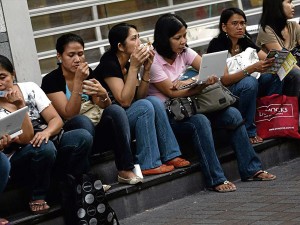‘Pedring’ stalls Hong Kong court ruling on maids’ residency
HONG KONG—Hong Kong on Thursday postponed a landmark ruling over whether foreign maids should be allowed to settle permanently in the city, in a case which has sparked heated debate on equal treatment.
The action by Evangeline Banao Vallejos, a Philippine domestic helper who has lived in Hong Kong since 1986 but was denied permanent residency, has cast a spotlight on the financial hub’s treatment of its army of foreign maids.
The High Court, which heard the case for two-and-a-half days from August 22, was scheduled to announce a ruling at 10 a.m. but the session was forced to be postponed over a typhoon warning issued early Thursday.
The number eight tropical cyclone warning, raised for deadly Typhoon “Nesat” (“Pedring,”) brought disruption to the city as schools and transport services were suspended while courts and government offices were closed.
“We will expect the judgment to be delivered tomorrow, we will be seeking a confirmation later today,” Vallejos’ lawyer Peter Barnes told AFP.
Court officials could not be immediately reached for comment.
Right to equality
Activists have said a successful legal challenge—the first of its kind in Asia—would entrench domestic workers’ right to equality, but opponents fear it would open the floodgates to the immigration of thousands.
The High Court decision will be crucial as Vallejos’ legal battle is the first of five launched by Filipinos—the other being a couple, and a mother and son—who have filed similar lawsuits, due to be heard in October.
Under Hong Kong’s Basic Law, or mini-constitution, foreigners can apply to live there permanently after seven years of uninterrupted residency—but the city’s 292,000 domestic workers are specifically excluded from that right.
Vallejos challenged the restriction, saying it was unconstitutional and discriminatory, but the government argued in court that it was “appropriate” and it is empowered to define who is eligible for residency.
It is almost certain that the ruling however will not be the end of the legal challenge—as both lawyers for the government and Vallejos have indicated they will appeal to the city’s highest court should they lose the case.
An appeal must be filed within 28 days.
Implications on other countries
The case could also have implications beyond Hong Kong for other Asian economies that rely heavily on cheap imported labor for cooking, cleaning and looking after children, in order to allow women to join the local workforce.
Foreign maids in Hong Kong are entitled to better working conditions than in other parts of Asia—they are guaranteed one day off a week, paid sick leave, and a minimum wage of HK3,740 ($480) a month.
But rights groups say they still face general discrimination and a lack of legal protection. A maid’s visa is tied to a specific employer, leaving her vulnerable to domestic abuse, the activists say.
Without the right to permanent residency, if dismissed by her employer she must find another job in domestic service or leave Hong Kong within two weeks. AFP
Originally posted at 09:25 pm | Thursday, September 29, 2011
